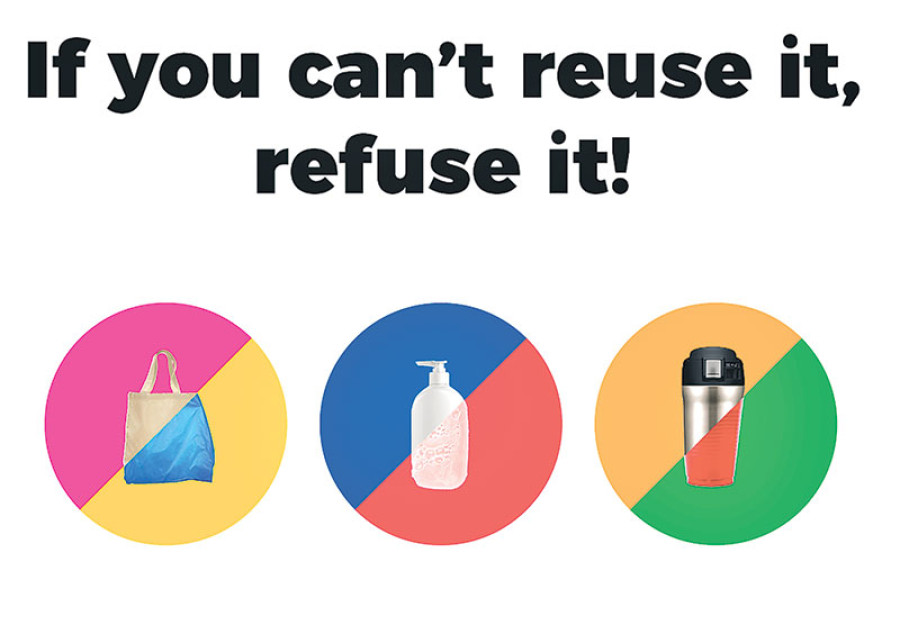Opinion
A plastic world
Microplastics in the sea now outnumber stars in our galaxy. It’s high time we woke up to the problem
Valerie Julliand
Kathmandu alone uses around 4,700,000 to 4,800,000 plastic bags daily. In Nepal, 16 percent of urban waste is comprised of plastic, which is 2.7 tons of daily plastic garbage production. And this is just Kathmandu. When you look at the global level the data is staggering. Researchers claim humans have produced 9.1 billion tons of plastic so far, and much of it ends up in nature—causing harm to both living beings and the environment.
Besides the sheer quantity of plastic waste being produced, one of the major problems with plastic is its resistance to degradation. A conservative estimate puts the average time for one single plastic bag to completely biodegrade at 500 years. This means that not only most of the plastic we use during our lives will outlive us, but that our plastic footprint also will affect the generations to come.
A huge amount of plastic finds its way into river systems, and eventually into the global ocean ecology.
Choices make a difference
The Hindu Kush Himalaya covering the connected mountains of eight countries—Afghanistan, Bangladesh, Bhutan, China, India, Myanmar, Nepal and Pakistan—are the source of ten great rivers that provide drinking water, irrigation, hydropower and life, eventually reach the oceans. The flow of water from the Himalayas to the oceans also carries plastics and solid waste, posing a threat to both ecosystems and people in the mountains, plains and seas. In Nepal, plastic waste is well known for clogging the rivers and streams in the mountains and hills, resulting in flash floods. The impact of what we do in the mountains is also felt downstream. In fact, like Kathmandu, most of the urban centers in the Hindu Kush Himalaya region are flooded with solid waste, including plastics. The 12 Indian Himalayan states are generating as much as 22,372 metric tons of municipal waste daily. With increased connectivity, more plastics find their way to mountain shops, and more tourists add to the demand and use of plastics.
If recycling of plastic and control mechanisms do not keep pace with the production rate of single use plastic, researchers have estimated that the world will end up with 13 billion tons—the equivalent of about 30,000 fully loaded supertankers—of plastic by 2050.
The effects of plastic pollution on the environment are devastating. To recognise this problem, the theme for the World Environment Day this year is ‘Beat Plastic Pollution – if you can’t reuse it, refuse it’ aiming at reducing single-use plastic pollution across the planet.
The good news is that we can all play a role in reducing plastic pollution. The small choices we make in our everyday life add up to making a big difference for the overall environment. Every time you make a conscious effort to avoid or recycle plastic products, you are lowering the risk of environmental damage—and ultimately, your own health.
The government has already recognised the need to keep the environment clean. In April 2015 Nepal declared Kathmandu a polythene bag-free zone. This said, Kathmandu is still a long way from being completely free from plastic bags. Several other areas have followed suit and declared themselves plastic-free, including Parbat, Myagdi, Damak and Ilam. Plastic bans in urban mountain centers like Gangtok and Nainital in India in the late 1990s have demonstrated that daily life is equally comfortable with reduced plastics.
Lead by example
The fact that supermarkets do not give and sell plastic bags is a massive bonus, which forces people to be more environmentally conscious. Some of the traditional products of Nepal—such as the leaf plates—are having a renaissance today. There are also campaigns for cleaning up the Everest area, where private companies, as part of their corporate social responsibility, are helping to clean out the trash on the mountains. United Nations in Nepal and Sagarmatha Pollution Control Committee in collaboration with Yeti Air are undertaking an Everest Clean Up Campaign setting up an ambitious target to fly out 100 tons of plastic and other waste from the Everest region to have it recycled. Similarly, in the Kailash Mountain region in Tibetan Autonomous Region of China with efforts from ICIMOD, travel agencies operating there
have started managing the solid waste generated by the large number of tourists and pilgrims. This is already making a visible difference.
Nepal has a unique opportunity in the current federalisation and development process to take into account the environment as it forges ahead in its achievement of the Sustainable Development Goals (SDGs). The word “sustainable” cannot be left out of the equation, and pollution—including plastic pollution—is an important element of this.
In many ways, Nepal has set a global example in protection of the environment. It has been a pioneer in the execution of community-based forest management initiatives that have resulted in a 44 percent breathing forest cover and it has brought back from the brink of extinction some much known species as well as some of the lesser known ones. Considering its geographical position at the foothills of the Hindu Kush Himalaya and being an important source of fresh water to the downstream countries, Nepal also has the potential for becoming a leading example for combating plastic pollution in the region—if the right waste management systems are put in place.
Today, Nepal is undergoing important political and social change. Nepal has a new constitution and federal structure in place which have decentralised the right to manage Nepal’s natural resources at the provincial level. Similarly, Nepal is committed to achieving the SDGs which align with social, economic and environmental aspirations of the country in the most comprehensive roadmap to 2030.
On World Environment Day today and every single day from now on, let us urge ourselves to be more aware of how plastic is impacting our ecosystems, health and economies. Let all of us act responsibly so that we can create conducive conditions for future generations to inherit a stable and thriving natural environment. As a first step to beating plastic pollution, let us all take one simple action of saying no to single-use plastic in our everyday life. Let us all refuse anything we can’t reuse because if 9 billion tons of plastic isn’t too much already then how much is too much?
Julliand is the UN Resident Coordinator in Nepal, Molden is the Director General of ICIMOD and H.E. Johannessen is the Norwegian Ambassador to Nepal




 21.12°C Kathmandu
21.12°C Kathmandu










